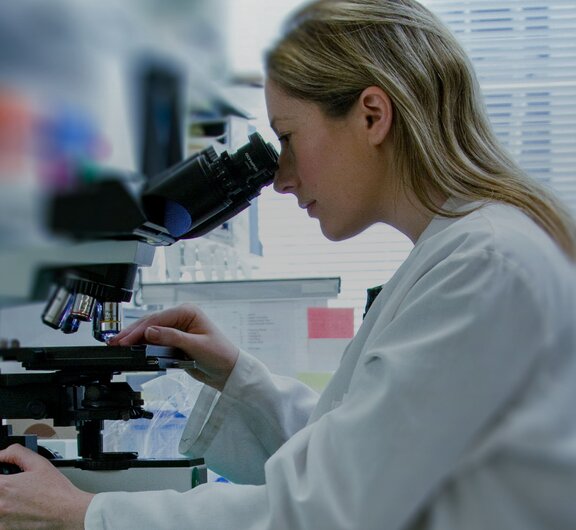
Research & innovation
Standards show us today what will happen tomorrow, and therefore provide the framework for research results fit for the market. Austrian Standards is involved in a large number of European research and innovation projects, including Horizon Europe, and supports the development of standards as they transition from idea to product.
Do you want to take your research and innovation to the next level with standards?
Benefiting from standards in research
One researcher has had a revolutionary idea. In our video, she discovers how she is able to save time and money with standards, both in research and product development. Join her on this exciting journey.
Creating better networks between research and standardisation
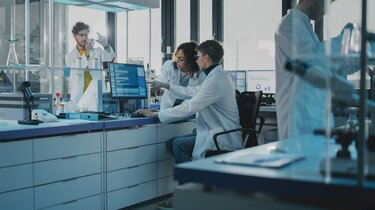
Austrian Standards has set up the "Executive Council Committee for Research, Innovation & Standardisation ("Präsidialratsausschuss Forschung, Innovation & Standardisierung") to reinforce and optimise the link between research and standardisation. The members are:
- Austrian Cooperative Research (ACR)
- Austrian Institute of Technology (AIT)
- AWS GmbH
- Austrian Federal Ministry of Labour and Economy
- Austrian Federal Ministry of Education, Science and Research
- Austrian Federal Ministry for Climate Action, Environment, Energy, Mobility, Innovation and Technology
- Federation of Austrian Industries (IV)
- Infineon Technologies AG
- Austrian Academy of Sciences (ÖAW)
- Austrian Conference of Universities of Applied Sciences (Österreichische Fachhochschul-Konferenz)
- Austrian Patent Office
- Austrian Electrotechnical Association (OVE)
- Oxfirst Ltd.
- Austrian Council for Sciences, Technology, and Innovation (RFTE)
- weXelerate GmbH
- Austrian Economic Chamber (WKÖ)
- Vienna Business Agency (Wirtschaftsagentur Wien)
EU and Austrian Standards
Here you can find an overview of the European Commission with regard to all ongoing research and innovation projects involving Austrian Standards.
Current reference projects
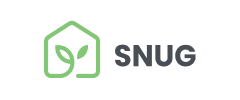

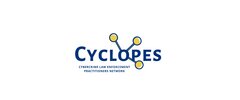
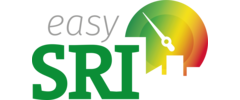

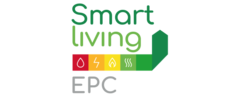
The EU-funded CYMEDSEC horizon Europe project will create new cybersecurity standards based on security-by-design. It is collating evidence from real-life cases in order to establish a benefits/risks tool set for industry and regulatory bodies. The project consortium brings together experts from the worlds of regulation, cybersecurity, technology and clinical fields to develop secure solutions for the Internet of Medical Things (IoMT).
SNUG addresses the significant environmental impact of buildings and is undertaking pioneering work in the field of sustainable construction solutions. The EU project aims to shake up the construction industry. Its focus is on innovative methods, which help architects and builders in selecting the best thermal insulation materials and planning new builds or renovations.
Reincarnate is a European research and innovation project involving 16 organisations. It is hoping to reduce the carbon footprint of the construction sector and to promote the recycling and reuse of construction products and materials through a circular economy. The construction sector is one of the largest producers of waste in Europe and is responsible for roughly 10% of CO2 emissions.
Given the complexity of cybercriminality, the EU's law enforcement agencies need industry and science to come up with innovations for them. CYCLOPES is developing research approaches and solutions to assist them. It is also providing workshops for law enforcement agencies in which participants analyse their capabilities, skills gaps and requirements in terms of procedures, training, legal matters and standardisation.
easySRI is an online platform, providing services for automated SRI (Smart Readiness Indicator) calculations. It is based on the final report into technical support when developing an SRI for buildings, which was produced under the management of the European Commission's Directorate-General for Energy. The platform serves as the basis for effective SRI implementation and enables testing at EU member state level.
GREEN-LOOP aims to support the bio-economy at European level through robust product design. Within the framework of this project, three value-added chains are being implemented and three new bio-based products are being developed: multi-functional rubber pads, bio-plastic closures for oil and fruit juices, and bearings made from composite wood for plastic coating machines. The new products have a significantly lower ecological footprint, are not toxic, can be recycled and are reusable. The vision of GREEN-LOOP is also to retrofit and optimise existing conventional production systems.
The SmartLivingEPC project is aiming to produce certificates with the aid of digitalised tools. The assessment information for building shells and systems is accessed from BIM data, including energy and sustainability information for the planned and actual building performance. The new certification system will also cover aspects such as water consumption, noise pollution and acoustics. One particular aspect of SmartLivingEPC will be its application in more extensive building complexes where it aims to certify energy use at district level.
Previous reference projects
The PRECEPT PROJECT uses ultramodern technologies to turn conventional housing into efficient and proactive housing. It is striving to achieve a smooth and almost cost-neutral transformation, which improves performance and energy efficiency as well as the well-being of inhabitants.
The LEVEL-UP project is developing a scalable platform, covering the entire life cycle of a recursive, low-cost, holistic and integrated application of circular principles to the digitalisation of factory 4.0. The process includes digital twins, modernisation methods, renovation and reprocessing activities and much more besides.
SEALIVE stands for Strategies of circular Economy and Advanced bio-based solutions to keep our Lands and seas alIVE from plastics contamination. The project aims to demonstrate innovative circular strategies for bio-based plastics in land-based and marine applications, which are based on financially and technically sustainable business models.
ASHVIN is aiming to significantly improve the productivity of the European construction industry and to cut costs while simultaneously ensuring the highest safety standards. This is to be achieved through a Europe-wide digital-twin standard, an open-source digital-twin platform, which integrates IoT and imaging technologies, as well as a set of tools and procedures. These should simplify use of the platform and the standard and make improvements in productivity, costs and safety possible.
The EU-funded TINKER project is creating a new affordable and resource-efficient method for producing RADAR and LiDAR sensor packages for the European automotive and micro-electronics industries. The method is based on the additive manufacturing and inline feedback control mechanisms, which enable high throughput and flexibility as well as improving automation, precision and reliability.
D2EPC is laying the groundwork for the next generation of dynamic Energy Performance Certificates (EPCs) for buildings, based on the Smart Readiness of a building as well as the corresponding infrastructure and management systems for capturing data.
The project uses the concept of the "digital twin" to calculate indicators for energy, the environment, finances and human well-being and to determine the EPC classification of a building.
CitySCAPE is concerned with the cybersecurity of multi-modal transport systems, in other words with systems that use different means of transport within a particular period of time. The goal is an interoperable software tool kit for identifying threats, assessing the impacts of an attack, improving the predictability of zero-day attacks (= attacks which take place on the very same day on which the weak spot in the software used is detected) and supporting collaboration between Computer Emergency (CERT) and Computer Security Incident Response Teams (CSIRT).
A plan for standardisation produced within the framework of CitySCAPE should ensure that the project results have a long-term impact on cybersecurity in the transport system.
The STRATEGY project is working on a pan-European pre-standardisation framework as well as new standards in eight subject areas of crisis management. These include search and rescue operations; protection of critical infrastructure; deployment planning; management and control; early warning and rapid assessment of damage; chemical, biological, radiological, nuclear and highly explosive threats (CBRN-E); training; terminology/symbolism.
The project goal is to improve the EU's resilience in the face of all kinds of natural and man-made catastrophes (multi-hazard approach). This is to be achieved by ensuring the safety of first aiders and boosting their operative capacities through standardisation. New solutions and procedures are to guarantee an effective and joint response to crises.
The FORMOBILE project is aiming to develop new kinds of tools to capture and decode mobile data, which has not been available to date. It also aims to produce new forensic standards for mobile phones and to implement training courses for police and law enforcement agencies based on these new tools.
The aim of EFPF (European Connected Factory Platform for Agile Manufacturing) is to network several smart factory platforms into one smart factory ecosystem. It provides infrastructure, tools and support to make possible a smooth transition to services and solutions, which have tended to be scattered in the past.
The CEWASTE project It provides infrastructure, tools and support to make possible a smooth transition to services and solutions, which have tended to be scattered in the past. The aim of the project is to develop, validate and introduce a voluntary system of certification for collection, transport and treatment systems for important types of waste, containing significant volumes of such raw materials.
The 4FUN project has developed a standardised tool for assessing chemical contamination (MERLIN-Expo). It covers the entire chain of contamination assessment from concentrations in water, air and/or ground and internal dosage, extending to the target organs and culminating in health risks.
CIRRUS (Certification, Internationalisation and Standardization in Cloud Security) has produced a comprehensive overview of standardisation activities and legal acts of relevance to cloud computing, including a series of recommendations for cloud security, which support the other standardisation activities of a cloud security control framework.
There are many different opportunities available to you for making profitable use of standardisation for research and innovation:
- You can use existing standards or drafts and benefit from consolidated practical experience.
- You can personally join a committee working to develop standards and help to shape the development at an early stage in your research project.
- You can network with national, European or international experts through involvement in the committees.
We are happy to help.
Drive your research and innovation forwards with standards.


